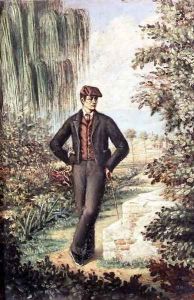Mosen Jacinto Verdaguer Paintings
Mossèn Jacinto Verdaguer, born on May 17, 1845, in Folgueroles, Catalonia, Spain, is one of the towering figures of Catalan literature, particularly renowned for his contributions as a poet and priest. Verdaguer's early life was deeply rooted in the rural world of Catalonia, which provided a rich tapestry of imagery and themes that he would weave throughout his literary career. His profound connection to the landscapes and traditions of his homeland became a hallmark of his work, imbuing it with a distinct Catalan identity.
Verdaguer's path to priesthood, which culminated in his ordination in 1870, did not deter his literary ambitions. Instead, it enriched his poetry with spiritual and existential depth. His clerical vocation and devout Catholic faith influenced much of his writing, where he often explored themes of faith, redemption, and the sublime beauty of creation. Despite his religious commitments, Verdaguer's poetry transcended ecclesiastical circles, resonating with a wide audience through its lyrical beauty and profound humanism.
The poet's magnum opus, 'L'Atlàntida' (1877), and 'Canigó' (1886) are celebrated epics that reflect his mastery of language and deep love for Catalan culture and history. 'L'Atlàntida' garnered him widespread acclaim, including the admiration of literary figures such as Victor Hugo, and played a pivotal role in the Renaixença, the Catalan cultural and literary revival of the late 19th century. 'Canigó' further cemented his status as a literary giant, offering a lyrical narrative steeped in the legends and landscapes of the Pyrenees.
Despite his monumental contributions to literature, Verdaguer's life was not without controversy and personal struggles. His later years were marked by conflicts with ecclesiastical authorities and periods of mental health challenges. Nonetheless, he remained a beloved figure in Catalan culture until his death on June 10, 1902, in Vallvidrera (Barcelona). Today, Mossèn Jacinto Verdaguer is revered as a national poet of Catalonia, a symbol of Catalan identity and resilience, and a pivotal figure in the history of Catalan literature. His works continue to be celebrated for their lyrical beauty, emotional depth, and cultural significance.
